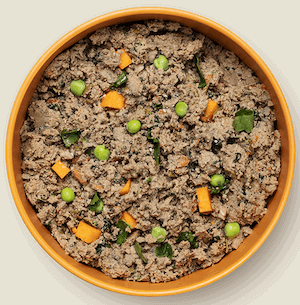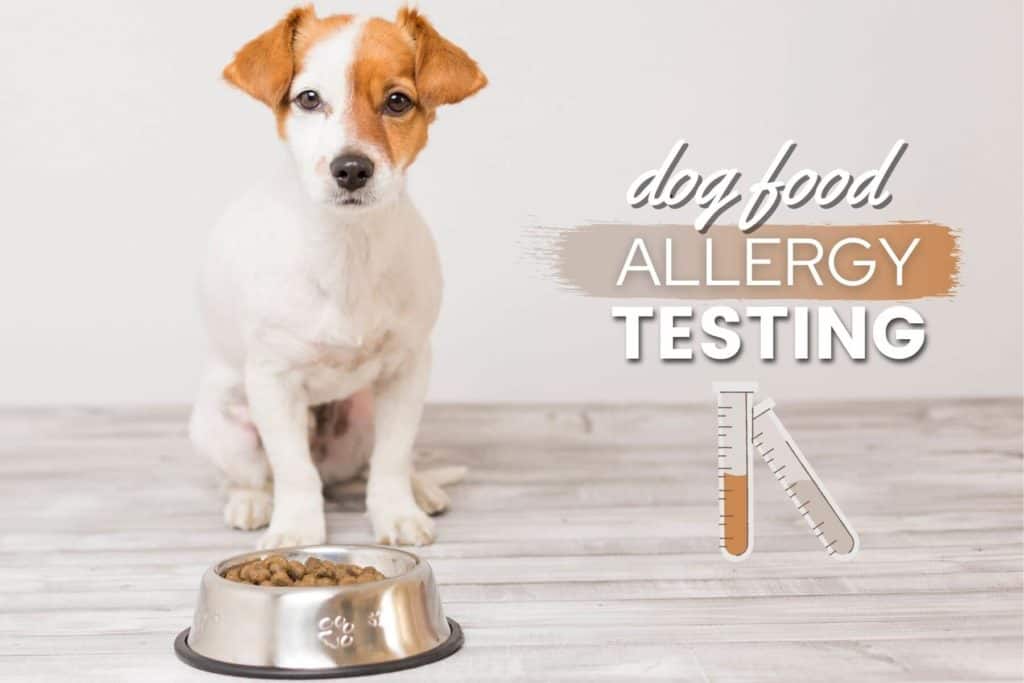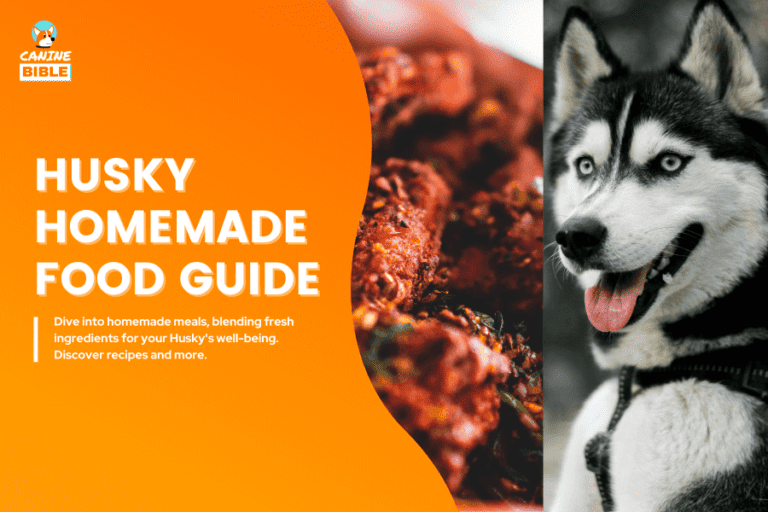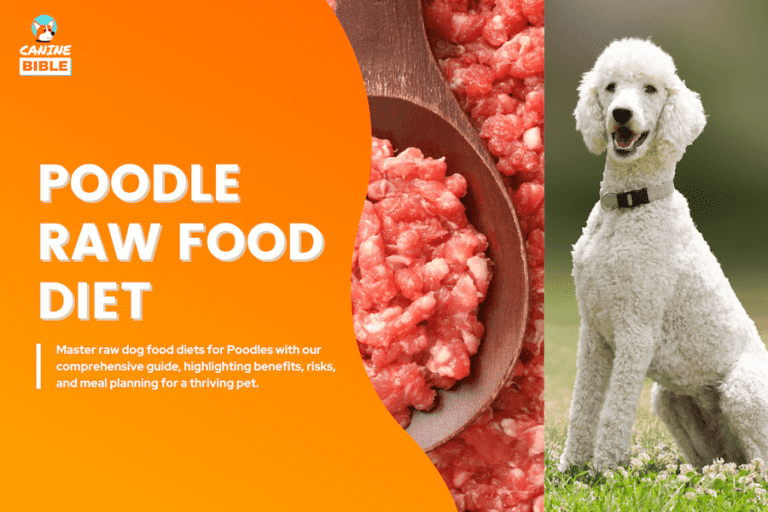Can Dogs Eat Beef? Are All Beefs Cuts Safe For Dogs?
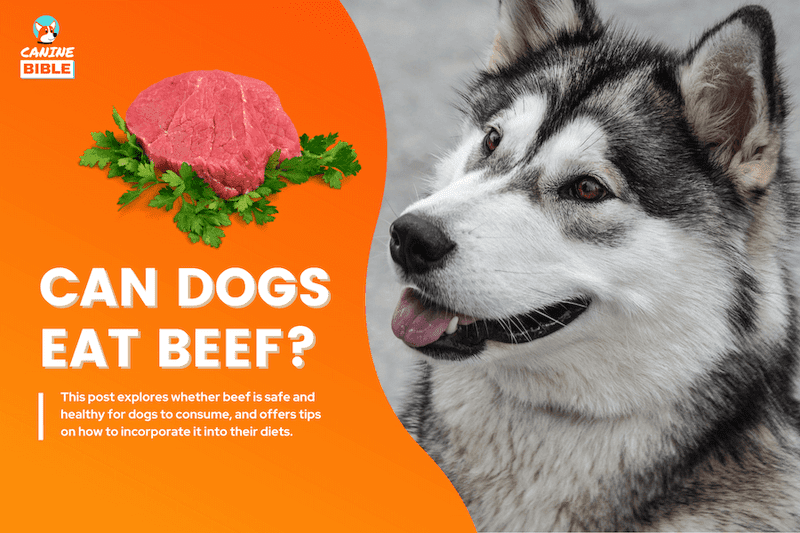
Canine Bible is reader-supported. We receive affiliate commissions via some of our links. This doesn’t affect rankings. Learn more.
Can dogs eat beef? Yes, beef is a common ingredient in dog food and treats. Beef is categorized as red meat — a term used for the meat of mammals. Generally, dogs can eat beef safely as their primary source of protein, vitamins and minerals.
But, you may have wondered whether it’s safe to give your furry friend a taste of that juicy steak you’re enjoying for dinner. After all, dogs are known for their love of meat, but not all types of beef are created equal. Some aspects of beef make it not suitable for dogs.
For instance, did you know some beef types are inappropriate for dogs? What about processed beef? Is it safe for dogs, or will it cause cancer? Did you know beef is harder to digest than other meats?
In this post, we take a closer look at the benefits, risks, research, and everything in between so you can safely add beef to your dog’s diet. Let’s dive right in!
Is Beef Good For Dogs?
Beef is good for dog consumption and has been commercially available pet foods and treats for decades.
It is an excellent source of protein and a wide variety of nutrients, including vitamins B12 and B6, zinc, selenium, niacin, phosphorus, riboflavin, iron, and choline for maintaining a healthy diet for dogs.
Beef is as beneficial as other meats, such as turkey and chicken. In some areas, beef is more nutritious than most traditional meats dogs eat. Compared to fish or turkey, beef provides a higher protein count per once. Beef also contains higher amounts of vitamin B12, zinc, and iron when compared to chicken, making it a good food if your dog needs nutrients due to nutrient deficiencies or health reasons.
It’s worth noting that meats contain a substantial amount of L-carnitine, with beef containing one of the highest amounts.[1] Research shows that L-Carnitine positively impacts the performance and recovery of dogs. It also positively affects lean mass and intensity of exercise (keeps dogs active).[2]
Dogs also prefer to eat beef instead of chicken, horsemeat, and liver.[3]
The quality of the beef, its fat content, how it’s prepared, and where it comes from can all impact whether or not beef is good for dogs to eat.
Is Beef Safe For Dogs? Ingredient Breakdown
Here is a breakdown of the ingredient composition of raw lean beef per 100g (3.5 oz) to help you understand if this food is safe or not for dogs.[4]
**This nutritional value is for lean beef specifically. Nutritional values will vary based on the type of beef.
| Nutrients | Lean Beef Per 100g (3.5 oz) |
|---|---|
| Water(g) | 73.1 |
| Protein (g) | 23.2 |
| Fat (g) | 2.8 |
| Energy (kJ) | 498 |
| Cholesterol (mg) | 50 |
| Thiamin (mg) | 0.04 |
| Riboflavin (mg) | 0.18 |
| Niacin (mg) | 5.0 |
| Vitamin B6 (mg) | 0.52 |
| Vitamin B12 (μg) | 2.5 |
| Pantothenic acid (mg) | 0.35 |
| Vitamin A (μg) | <5 |
| Beta-carotene (μg) | 10 |
| Alpha-tocopherol (mg) | 0.63 |
| Sodium (mg) | 51 |
| Potassium (mg) | 363 |
| Calcium (mg) | 4.5 |
| Iron (mg) | 1.8 |
| Zinc (mg) | 4.6 |
| Magnesium (mg) | 25 |
| Phosphorus (mg) | 25 |
| Copper (mg) | 0.12 |
| Selenium (μg) | 17 |
Let’s take a closer look at some of the key nutrients in beef and how they can benefit your dog:
Beef also contains several bioactive substances and antioxidants, which may affect health when consumed in adequate amounts. Some of the most prominent compounds in beef include creatine, taurine, glutathione and conjugated linoleic acid (CLA).
Can Dogs Eat Beef?
Dogs can safely eat beef as part of a balanced diet. However, It’s important it’s the proper beef cut and has an appropriate fat percentage.
A 100% beef diet with 70% lean meat is insufficient protein and exceeds safe limits for total fat for dogs. Beef cuts that have less than 85% to 90% lean beef are the best for your dog.[10] Select lean cuts that are free of bones, fat, and gristle. Ground beef, lean cuts of steak (chuck steak or round steak), and lean roasts are all excellent options. These cuts have less fat and are easier for dogs to digest.
Remember that not all dogs have the exact nutritional and health needs. Dogs should not consume beef if they are allergic to it or have health conditions that make beef unsuitable. Dogs can also eat raw meat (beef) as part of a raw dog diet. However, you need to know several risks associated with raw feeding first.
It’s always best to consult a veterinarian before changing your dog’s diet.
Benefits of Beef in Dog Food
Here are the main advantages of beef for dogs.
Is Beef Bad For Dogs?
Generally, beef is not bad for dogs. However, there are a few instances when beef may be bad for dogs. Beef may harmful to your dog is if your dog has a beef allergy. Unfortunately, dogs’ most common food allergens are proteins, especially from meats such as beef.
Cheap processed beef products such as beef-based kibble may be particularly high in sodium (salt). Too much salt is dangerous for dogs and can lead to salt toxicosis. However, most beef kibble brands have adequate levels of sodium. Just check the label.
Feeding your dog fatty cuts of beef, such as ribeye or T-bone steak, as these can cause gastrointestinal issues. High-fat diets can negatively affect dogs’ cellular health, behavior, and cognitive functions.
If you are cooking a beef-based recipe for your dog, it’s also essential to avoid giving your dog beef that has been seasoned or cooked with onions, garlic, or other ingredients that can be toxic to dogs.
Know that many dog food and treat brands label their product “beef”’ when they are made from “beef meal.” there is a big difference between beef meat and beef meal. Beef meal is made from parts of animals that aren’t allowed to be sold for human consumption, things like residual meat, offal, connective tissues, and in some cases, bones. While feeding this to your dog won’t cause any harm, fresh beef dog food is healthier and safer for dogs. Check the label and avoid beef meal-based dog food if possible.
Possible Side Effects & Risks of Feeding Beef to Dogs
The following symptoms may indicate a bad reaction to beef. Keep an eye out for them and contact your vet if necessary.
You should call your vet immediately if your dog eats beef and shows an allergic reaction or any other adverse symptoms.
Can’t reach your vet? Contact the Pet Poison Helpline at 1-855-764-7661 or chat with a veterinary professional via online vet chat (24 hours a day, 7 days a week).
Ways to Feed Beef to Your Dog
Dogs can consume beef in the form various forms:
If you want to feed your dog beef, we recommend feeding beef dog food made from human-grade ingredients. Ollie offers one of the best beef dog food recipes we’ve tried. Ollie’s beef recipe is personalized to your dog’s dietary needs and goals, made by registered veterinarians, uses human-grade ingredients and meets the dog nutritional standards set by AFFCO.
When buying beef-based kibble, make sure the recipe is made with real beef (not beef meal) and organic ingredients.
Are Dogs Allergic to Beef?
Unless your dog is allergic to beef, they probably already consume it regularly. But there’s always a chance your dog could be allergic or sensitive to beef. We suggest you do an at-home allergy test before giving your dog beef to help you determine if they are sensitive or intolerant to this food — or any other foods. If your dog shows no signs of an allergic reaction, it should be safe to feed your dog plain cooked beef in moderation or as part of a complete diet.
Can Puppies Eat Beef?
Yes, puppies can eat beef as part of a balanced diet. It’s important to know that AAFCO recommends that the minimum crude fat level for dogs is 5% for adults and 8% for puppies. For this reason, your puppy’s beef cute should have a little more fat than an adult’s. Growing puppies need to gain weight and generally need higher fat levels.
Puppies generally have more sensitive digestive systems than adult dogs and may be more prone to an upset stomach after eating certain foods. When feeding beef to puppies, work with a veterinarian for personalized dietary advice for your puppy.
Frequently Asked Questions
Here are the most commonly asked questions about beef and dogs.
Can Dogs Eat Beef? — Conclusion
In conclusion, while beef can be a valuable source of protein and other nutrients for dogs, it also comes with potential risks such as feeding beef cuts with high-fat contents. As with any food, it’s important to approach beef cautiously and consider your dog’s health needs and dietary restrictions.
According to our research, the best way to feed beef to dogs is as part of a well-formulated fresh diet. You can also choose to make it at home, but it requires more time and vet advice. Feeding beef in the form of kibble is another alternative, make sure the recipe is made with real beef (not beef meal) and organic ingredients. Dogs can also eat raw beef, but it needs careful planning as the risk for contamination is higher.
As long as your pup isn’t allergic, they can enjoy beef every day as part of a balanced diet whether it’s in their food or as a treat.
To be safe, consult your veterinarian before making any dietary changes, and alert your vet immediately if your dog has any adverse reactions to eating beef.
Like It? Subscribe & Share!
Canine Bible authorship represents the unified voice of our entire editorial team and our in-house veterinarians rather than a single author. Each article, blog post, and review published under the Canine Bible name undergoes a rigorous review process, involving all team members to guarantee accuracy and up-to-date in accordance with the latest veterinarian research. This collaborative effort is an integral part of our editorial process and aligns with our four pillars of content creation. This approach ensures our content is backed by expert knowledge and factual information, offering our readers reliable, actionable, and trustworthy content.

